Presbyterian clergy join hundreds in 40-day ‘Fast for Gaza’
Veterans for Peace organized the national fast

On May 22, the nonprofit Veterans for Peace — in partnership with 38 co-sponsoring organizations — launched a 40-day “Veterans and Allies Fast for Gaza.” A core group of seven activists is keeping vigil together in New York City while limiting themselves to 250 calories daily — the estimated amount of calories Palestinians in Gaza are currently being forced to subsist on. Around the United States, nearly 800 people have joined the fast from afar, including Presbyterian clergy who say their faith compels their participation.
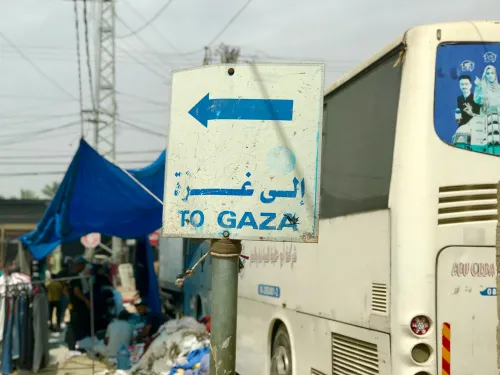
The relationship between Israel and Palestine has been shaped by violence, oppression, and apartheid since the creation of Israel as a modern state and the resulting forced displacement and ethnic cleansing of hundreds of thousands of Palestinians in the late 1940s. Multiple General Assemblies of the PC(USA) have addressed the occupation of Palestine and human rights violations against Palestinians and have called for an end to the violence on both sides.
On Oct. 7, 2023, an attack from Hamas and retaliatory declaration of war from Israel began a major escalation in violence for the region. In its initial attack, Hamas killed 1,195 Israelis — including 815 civilians — and took 250 hostages. Another 511 Israelis have been killed in the 20 months since. As of June 2025, nearly 2 million Palestinians have been internally displaced in Gaza, and more than 56,000 Palestinians — more than half of them women and children — have been killed. This number does not include those Palestinians killed by indirect effects of the war, including malnutrition, disease and lack of access to medical care.
As violence continued to escalate in Gaza, a conversation group made up of 80 Presbyterians was curated on WhatsApp to stay informed about what was happening in the region and opportunities to support and advocate for Palestinians. This conversation group was one of many denominational subgroups organized by Christians for a Free Palestine, an ecumenical grassroots group that works to dispel myths of Christian Zionism and mobilize U.S. Christians to act in solidarity with Palestinians.
Presbyterian clergy fast for justice
One member of that group is the Rev. Addie Domske, an ordained minister in the PC(USA) who recently became the national field organizer for Friends of Sabeel North America (FOSNA). FOSNA is the North American chapter of a global advocacy network that supports the work of the Sabeel Ecumenical Liberation Theology Center in Jerusalem, a pro-Palestinian grassroots Christian organization and a partner of the PC(USA). Domske also serves on the steering committee of the Palestine Justice Network, a Presbyterian nonprofit that partners with CFP, FOSNA, and others in working toward a just peace in the Holy Land.
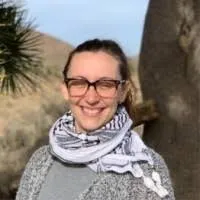
In her role with FOSNA, Domske has been one of the major organizers of the fast, coming alongside Veterans for Peace to support their initiative. She said a number of Presbyterians are participating — connected through Christians for a Free Palestine, FOSNA, the Palestine Justice Network, and other pro-Palestinian advocacy groups.
Domske said FOSNA executive director Jonathan Kuttab, a Palestinian human rights lawyer from Jerusalem, expressed a desire to organize a hunger strike in response to Israel’s announcement in early May that they would carefully control and limit the distribution of all food in Gaza. The UN’s humanitarian chief, Tom Fletcher, told the BBC on May 20 that 14,000 infants could die within 48 hours if more aid did not reach them. In addition to the threat of starvation, Palestinians in Gaza — including children — have been shot and killed by the Israeli Defense Force as they lined up to receive the limited food they are allowed.
At Kuttab’s direction, Domske put out feelers and connected with Veterans for Peace, which was interested in organizing a fast.
The Veterans and Allies Fast for Gaza has two demands: first, a resumption of aid to Gaza under United Nations authority, and second, that the United States stop arming Israel immediately. If these demands are not met by June 30, the conclusion of the fast, the organizers are calling on participants to escalate their protests.
The initial goal was to have five in-person fasters in New York and 250 dispersed elsewhere. Veterans for Peace surpassed that goal before the fast officially started, and the number of dispersed fasters continues to grow. Not everyone is fasting by consuming only 250 calories per day. Domske, who began her own fast on May 1, is fasting from meat. An 88-year-old woman known on Instagram as “Nana June” and her 98-year-old husband pledged to skip one meal in solidarity. Her video about their fast has more than one million views.
The Rev. Dr. abby mohaupt, a minister member of the Presbytery of Chicago who is also participating, says the flexibility of how people engage is crucial. She joined the fast late due to a half- marathon she already had scheduled. She’s restricting herself to 250 calories at time, at set times of day.
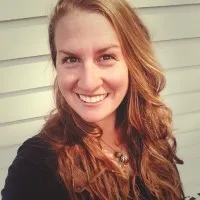
“Often in movement work, we get kind of stuck,” mohaupt said. “We have to show up to everything and do everything perfectly.”
mohaupt says that focusing on perfection actually makes the action about the activist instead of the people the activist is trying to support.
“The call is to make it about Palestinians and to say even if I can't show up perfectly, I'm going to show up the way that I can,” mohaupt said, “because Palestinian liberation and Palestinians deserve that.”
The Rev. Bruce Reyes-Chow, the Moderator of the 218th General Assembly (2008), led a delegation to Gaza during Holy Week alongside Domske and is participating in the fast from California. Reyes-Chow is fasting in the model of Ramadan, refraining from consuming anything other than liquids between sunrise and sunset. He says that doing so has led to many conversations about the fast.
Domske says that is part of the benefit of this type of action.
“Eating is such a social component of our lives and so it interrupts your social sphere,” Domske explained. “So 700+ people across the country are going about their day and having to explain to people, ‘I’m doing this for this and I’m going to keep doing it until this happens.’”
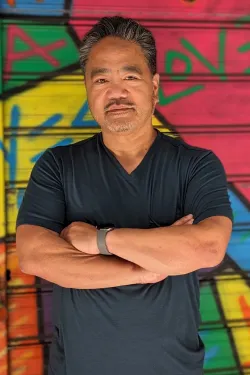
Reyes-Chow explains that, while he has long identified as pro-Palestine, two particular experiences prior to Oct. 7, 2023, made it an especially potent cause for him.
“I was moderator for 2008-2010, and the most hate mail I got was about Israel-Palestine … because we were beginning to look at divestment a little more seriously at that point,” he said. He was further impacted by a trip to the region in 2015 led by then-mission-coworker Kate Taber, which made the stories he had heard real.
Reyes-Chow was invited to return to the Middle East in February 2024 as part of an ecumenical delegation organized by the Palestine Justice Network (then called the Israel-Palestine Mission Network). Relationships formed during that trip motivated him to become further involved in Palestinian advocacy. He went on to lead two more delegations and is in talks about a future delegation made up of former moderators of the denomination.
Reyes-Chow is the author of several books and works full-time as a writer and speaker. He says his work gives him the freedom to speak out about Palestinian in ways other pastors — particularly those who serve in parish settings — may not feel able. He also has a sizable following online and believes he can use his platforms — as well as in-person speaking events — to continue to bring attention to what is happening in Gaza. He receives a lot of questions from Presbyterians he interacts with, he says, but not much pushback.
One question he does get is how U.S. Presbyterians can honor the call to care for and advocate for oppressed people, including Palestinians facing life-threatening conditions in Gaza, while being sensitive to the Jewish people in their lives and their own Christian privilege.
Reyes-Chow acknowledges that it’s tricky, in part because it is assumed that if one critiques the actions of the Israeli government, it is a critique of all Jewish people. He says it’s important to remember that isn’t true, and also that there are many Jewish people who are against what the Israeli government is doing.
In fact, mohaupt said her engagement in Palestinian advocacy has been motivated in large part by the wisdom and passion of the rabbis she has worked with in interfaith climate advocacy. Every one of them signed on to a call for a ceasefire, she said.
Who is my neighbor?
Reyes-Chow also says that he thinks one issue is that many Christians in the United States don’t have close relationships with their Muslim or Arab neighbors. Meanwhile, churches — including PC(USA) congregations — often have close partnerships with neighboring Jewish congregations.
“So our default is to go to proximity and to ‘who do we know?’ and ‘where do we grow up?,’” Reyes-Chow said. “Part of that is an indictment of Christians in the U.S. about who and what relationships we’ve nurtured over time.”
For Presbyterians who are concerned that speaking on Israel and Palestine is not their place as Christians, Reyes-Chow emphasizes that there are many vocal Christians advocating for a Zionist perspective and pushing against Palestinian liberation. This is part of why he does feel so compelled to speak out on this issue. mohaupt agrees.
“Every form of aid that’s trying to come into Gaza has been turned aside, and thousands of children are going hungry or starving, and there are Christians saying that this is the right and the good thing,” mohaupt said.
She says such claims are in clear opposition to the teachings of Jesus, who was “really clear that we are to love one another and care for one another and feed the hungry and that is not what’s happening.”
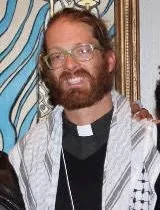
The Rev. Chad Collins, who serves as pastor of Valley View Presbyterian Church in Pittsburgh and worked as FOSNA’s national field organizer prior to Domske, says his faith compels him to care for and fight for those most marginalized without fear of the risks associated.
“When any of God's people are suffering, it should cause us to suffer ... and when we can do something about it, we must!” Collins said. “As we pray the Lord's Prayer, we pray to God to give us our daily bread. When not all are eating bread (food) then we cannot be satisfied that some of us can eat our fill. We do not pray to give me this day my daily bread. ... We pray give us this day our daily bread.”
Collins began the fast by subsisting on 250 calories per day, but had to shift his approach after becoming ill. Like Reyes-Chow, he is now taking inspiration from Ramadan, and allowing himself one meal per day.
The language of fasting and the timeline of 40 days carries clear religious significance for Christians, Muslims and Jews. Domske explains that across all three religions, the number 40 points to a kind of maturity and change. She hopes this 40-day fast brings change too, for Palestinians and for fasters.
She’s quick to point out, however, that Veterans for Peace, a secular organization, had already chosen the language of fasting before FOSNA came on board. Domske says some members of Veterans for Peace have been doing this for decades, having previously fasted in protest of the Vietnam War and Guantanamo Bay. FOSNA was able to add a spiritual lens, Domske said, describing a fast as a bodily commitment to “remember in placement of whatever you took away.”
Attention, please!
These clergy and others participating in the fast recognize that their demands may not be met. They are frustrated but unsurprised by the lack of mainstream media coverage the nationwide fast as received. Domske says there is already a plan for further action in New York on June 30, the day the fast is scheduled to conclude.
Leaning on her experience as a distance runner, mohaupt says this truly is a marathon and not a sprint. Indeed, the PC(USA) has been involved for decades in efforts to address the conflict between Israel and Palestine.
The General Assembly has historically supported what’s referred to as a “two-state solution,” with both Israel and Palestine having their own sovereign land. As Reyes-Chow noted from his time as Moderator, in the 2010s the denomination began to have serious conversations around divestment. In 2014, the denomination made international news when the 221st General Assembly voted to divest from three American companies cited as profiting from the continued oppression of Palestinians by their financial engagement with Israel.
Meanwhile, the Palestine Justice Network and the Presbyterian Peace Fellowship have advocated for Palestinian liberation for years, including supporting actions like the GA’s divestment action in 2014.
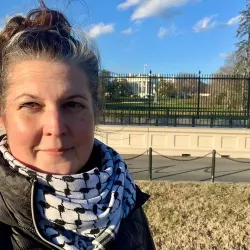
The Rev. Marietta Macy, co-director of the Palestine Justice Network, says in addition to Domske that mohaupt, Reyes-Chow, and Collins are all members of PJN, with Collins also having previously served on the steering committee.
An ecumenical push for peace
“As a network, we do our best to bring folks together around actions such as this one, and then we try to amplify their work within and outside of the PC(USA). This helps us show the PC(USA) that there is true investment in the struggle for a just peace in the Holy Land from our pews and pulpits across the denomination,” Macy said, adding that ecumenical and interfaith collaboration is a crucial component of their work.
“CFP, FOSNA, and so many other partner networks are working together, in our Christian language, as the body of Christ on Earth, ministering to and advocating for our neighbors the ways we understand Jesus would,” Macy said. “Each of our organizations have some differences in focus and gifts, but we are all moving the same direction as one body, knit together with a love of justice and devotion to God's sacred creation of neighbors near and far which this collective fast is a reminder of.”
While progress is slow and horrors continue to unfold in Gaza, the Presbyterian clergy who have committed to the work of Palestinian liberation remain hopeful. Domske and mohaupt are both parents of young children, and hope for a different world for them and for the children of Palestine and Israel.
“No one can be a good mother without acting on what they believe should be possible for their children,” Domske said in a press release about the fast. “Mothering can’t only be about saying the right thing, but has to also be about doing the right thing.”
Reyes-Chow said he feels called to remain hopeful no matter what, for two reasons. First, the Palestinian Christians he’s developed close relationships with tell him, “My family converted to Christianity at Pentecost. We’ve outlasted 200 kingdoms, and will still be here.”
Secondly, Reyes-Chow considers what his descendants will say when they look back at this time. “History is going to look at us … and I want them to say that we did everything we could.”
The four pastors encourage other Presbyterians to become involved however they can, connecting with local advocacy groups and Muslim and Arab communities, in addition to supporting the work of Palestine Justice Network, Christians for a Free Palestine, and FOSNA. In particular, Domske suggested people look into Interfaith Action for Palestine, which is organizing a national event to take place on June 30 and is designed to include folks who are new to this kind of work.
You may freely reuse and distribute this article in its entirety for non-commercial purposes in any medium. Please include author attribution, photography credits, and a link to the original article. This work is licensed under a Creative Commons Attribution-NonCommercial-NoDeratives 4.0 International License.




